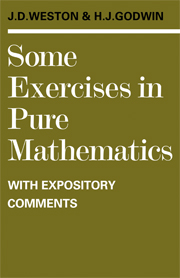2 - An approach to elementary analysts
Published online by Cambridge University Press: 30 March 2010
Summary
Elementary analysis is essentially the theory of the calculus, and one of its main themes is the possibility of inferring global properties of functions from local properties. (We make such an inference when, for example, we obtain the general solution of a differential equation.) The concept of a local property is a fairly subtle one; it was formed at a comparatively late stage in the development of mathematics, and it was not thoroughly understood until quite recent times. This, no doubt, is one of the reasons for the widespread practice of teaching the calculus without giving adequate attention to its logical foundations.
Many books have been written in which the calculus is presented as though it were an inductive science like physics. This may sometimes have been done through ignorance, but probably in most cases it has been done in the fallacious belief that a difficult subject can be made easier by concealing its logical structure from the student, at least in the early stages of instruction. That this kind of approach is unsatisfactory becomes increasingly clear as ‘pre-calculus mathematics’ becomes increasingly pervaded by the spirit of pure mathematics. An intelligent student who has tasted the delights of the axiomatic method will want the calculus to be presented as a strictly deductive discipline.† It is still not easy to do this, but some of the traditional difficulties can now be reduced.
- Type
- Chapter
- Information
- Some Exercises in Pure Mathematics with Expository Comments , pp. 111 - 114Publisher: Cambridge University PressPrint publication year: 1968



